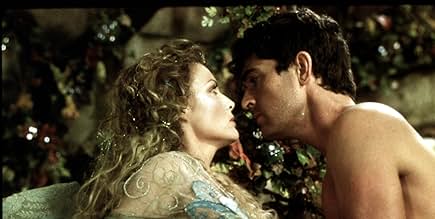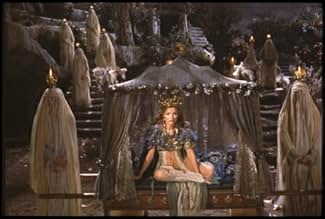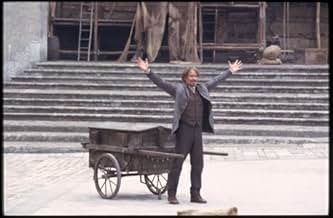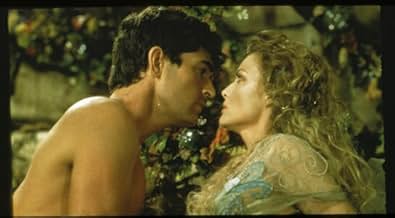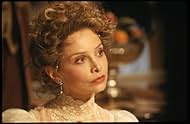NOTE IMDb
6,4/10
28 k
MA NOTE
La vie des amoureux est compliquée par la loi de la ville, les querelles de la royauté... l'amour.La vie des amoureux est compliquée par la loi de la ville, les querelles de la royauté... l'amour.La vie des amoureux est compliquée par la loi de la ville, les querelles de la royauté... l'amour.
- Réalisation
- Scénario
- Casting principal
- Récompenses
- 1 victoire et 2 nominations au total
Deirdre Harrison
- Hard-eyed Fairy
- (as Deirdre A. Harrison)
Avis à la une
There is much to recommend this "Midsummer Night's Dream" it's beautifully filmed, well acted by a starry cast and of course it's Shakespeare, full of humor, wit and insight. (As always with Shakespeare, you would do well to read the play before watching the movie, preferably with an edition that explains the subtler points of the dialogue.)
While wholeheartedly recommending this film for the above reasons, I would have to acknowledge that the overall feeling, despite its merits, is that this is a version seriously lacking in magic. Magic plays a large part of the proceedings but despite the special effects, this "Midsummer Nights Dream" is not nearly as uplifting and enchanting as it is intended to be.
Zefferelli's fantastic success with "Romeo and Juliet" was a one off, in that the principals were unknowns. Without big names, it's doubtful whether a lavish production such as this would ever have been made. It's often been stated by film makers that the crucial stage is that of casting. A film well cast will in effect cause the pieces fall together as they should.
The casting of this film is way off mark. Signing up a group of stars, both well known and talented, may be good for the box office, but they are a haphazard and motley bunch. There is no "cohesion" at all. Rupert Everett as Oberon may be a fine bit of casting, as may be Stanley Tucci as Puck; but not in the same production ! Pfeiffer and Everett too are uneasy, but the worst paring must surely be Calista Flockhart and Christian Bale. In a play where chemistry is everything, this glaring lack of chemistry between the players is a huge drawback.
Far more successful are the amateur players, headed by Kevin Kline in fine form with beautifully crafted performances by Roger Rees, Sam Rockwell and the others. Their scenes reveal what this could have been.
Still, enough remains to make this a worthwhile experience.
While wholeheartedly recommending this film for the above reasons, I would have to acknowledge that the overall feeling, despite its merits, is that this is a version seriously lacking in magic. Magic plays a large part of the proceedings but despite the special effects, this "Midsummer Nights Dream" is not nearly as uplifting and enchanting as it is intended to be.
Zefferelli's fantastic success with "Romeo and Juliet" was a one off, in that the principals were unknowns. Without big names, it's doubtful whether a lavish production such as this would ever have been made. It's often been stated by film makers that the crucial stage is that of casting. A film well cast will in effect cause the pieces fall together as they should.
The casting of this film is way off mark. Signing up a group of stars, both well known and talented, may be good for the box office, but they are a haphazard and motley bunch. There is no "cohesion" at all. Rupert Everett as Oberon may be a fine bit of casting, as may be Stanley Tucci as Puck; but not in the same production ! Pfeiffer and Everett too are uneasy, but the worst paring must surely be Calista Flockhart and Christian Bale. In a play where chemistry is everything, this glaring lack of chemistry between the players is a huge drawback.
Far more successful are the amateur players, headed by Kevin Kline in fine form with beautifully crafted performances by Roger Rees, Sam Rockwell and the others. Their scenes reveal what this could have been.
Still, enough remains to make this a worthwhile experience.
Though some critics have dumped on this film, I was charmed by it. The movie literally sparkles. The settings are full of rich colors and magical lighting. The romantic classical music is all well chosen to help induce the hypnotic or dreamlike qualities. And the cast is an utter delight.
This is a fluffy cloud of fairy dust -- just as Shakespeare intended.
This is a fluffy cloud of fairy dust -- just as Shakespeare intended.
This is a wonderful film and an excellent version of the classic that was done so very, very well in 1935 and 1968. No, this is not the Royal Shakespeare Company, it's Hollywood but damn good Hollywood. Why? How can canned commercial movie-making compete with the Bard's best? Why does this version make that of the RSC three years before PALE? Well, there's the cast, for one. Stanley Tucci is delightful as a drole erring Puck carrying out the directives of Rupert Everett's pompous Oberon. The delightful Cast of Players, including Rockwell, Irwin, Rees, Wright and (tah-DAH!) Kevin Klein as Bottom. The scenes with the lovelier than lovely Michelle Pfeiffer's Titania are wonderful and poignant. It is delightful to see that gentle erotica can be suggested without nudity or slathering tongues, sucking lips as well as the usual grunts-pants-moans, etc. The lovers are likewise delightful with great, fun-packed performances by Christian Bale's Demetrius and Dominic West's Lysander in complete tune with Anna Fiel's Hermia and Calista Flockhart's Helena. Even David Strathairn's Theseus and Sophie Marceau's Hippolyta are wonderful. The story is moved from Athens Greece to Athens, Italy, at the turn of the 19th century with the lovers escaping on bicycles. Stanley Tucci's confrontation with the bike is a delight. This is a wonderful film with some new twists that depart from but do not detract from the Bard. The bit with Kevin Kline's wife, hard-looking but attractive Heather Parisi, works well with the setting of this fun-filled, joyful presentation.
There have been many adaptations of Shakespeare plays over the last decade or so, most of them aimed squarely at younger viewers. You know the drill: The director picks out rocking, hip tunes to spice up the soundtrack and some hot, young stars to broadly interpret the Bard's work.
That's not the case here. Kevin Kline gets to ham it up as Nick Bottom, the base mechanical with delusions of thespian grandeur, and Michelle Pfeiffer gets to show off her own acting chops as Titania, the Queen of the fairies. Okay, so maybe a little knowledge of the play itself would help the average viewer, but if you're not a fan of the play, you can still witness some absolutely sumptuous camerawork and some funny, funny scenes - many of them dealing with the spellbound Bottom, who's been turned into a jackass. Stanley Tucci underplays (somewhat surprisingly) his role as the mischievous Puck, and even Callista Flockhart turns in a solid performance as one of four human (non-fairy) lovers.
That's not the case here. Kevin Kline gets to ham it up as Nick Bottom, the base mechanical with delusions of thespian grandeur, and Michelle Pfeiffer gets to show off her own acting chops as Titania, the Queen of the fairies. Okay, so maybe a little knowledge of the play itself would help the average viewer, but if you're not a fan of the play, you can still witness some absolutely sumptuous camerawork and some funny, funny scenes - many of them dealing with the spellbound Bottom, who's been turned into a jackass. Stanley Tucci underplays (somewhat surprisingly) his role as the mischievous Puck, and even Callista Flockhart turns in a solid performance as one of four human (non-fairy) lovers.
Wow... that person who gave it "zero stars out of ****" is a little confused... though not without entertainment value. His comment "Shakespeare would have been apalled" is laughable. why? Because most of his whining was about the plot itself. Does he not realize that Shakespeare WROTE the play A Midsummer Night's Dream, and that that makers of the movie followed the original play TO THE WORD, except for a few dialogue cuts that didn't affect plot? And then he went on to whine about how frivolous and silly the plot is...
you know what? All of Shakespeare's comedy plots are silly and frivolous. That's the point. Remember, in his time, he wasn't an intellectual mastermind... he was an entertainer for the masses. He gave the playgoers what they wanted in his plays, whether comedy, tragedy, or history- and what they wanted was love, mistaken identity, gratuitous violence, a few laughs, and to be entertained. Yes, he was a great playwright. One of the first, in fact, to really give changeability to his characters. Most writers of his time used purely stock characters. Good guys, bad guys, drunk guys, slutty chicks, virtuous chicks, idiots, smart guys... but never 3-dimensional characters. This is what Shakespeare changed. He created 3-D, CHANGEABLE characters.
And don't start on "Oh, you are being shallow". Shakespeare DID put a lot of deeper meanings and metaphore into his plays- but that DID come secondary to entertainment. And even his great plays like Hamlet and Macbeth, with some serious psychological "WTF???" going on, were pretty contrived. I mean, the end of Hamlet involves four dead bodies on the stage, mostly due to mix ups (Hamlet gets stabbed by Laertes' poisoned sword, they keep fighting and manage to switch swords, Laertes gets stabbed with his OWN sword, the queen drinks the poisoned wine meant for Hamlet, then warns him, and he stabs the king AND makes him drink the poisoned wine. Nevermind Ophelia's previous suicide because Hamlet was pretending to be insane, Polonius getting stabbed by Hamlet because Hamlet thought he was the evil king, Rosencrantz and Guildenstern dying in Hamlet's place when they were sent to get him killed, and of course, the death of Hamlet's own father by having poison poured in his ear) So don't start bashing the filmmakers. You said the only good thing they did was the atmosphere... but really, that's all that was left up to them- the presentation. The play was already written, the characters already created, the plot already silly and Chick Flick-y. Sorry. That idiotic "Shakespeare would be apalled" thing just bothers me. I mean, he wrote the fricking thing. So, the only conclusion I can draw from this inane and snooty review is that, like many others, the complexity of the play and its many subplots confused the hell out of you (May I say something about attention spans here??), so you tried to turn it around and blame it on someone else because you're too much of a dolt to figure out what's going on.
Ok, having ranted- I'll make this brief. A Midsummer Night's Dream is like a comedy-chick flick with the added advantage of a cool atmosphere and Shakespeare's poetic dialogue. It's a funny romantic comedic fantasy. If you like that sort of thing, see it. If you don't, then don't. And for God's sake, if you can't understand that dialogue, don't blame it on the filmmakers. There ARE people out there who DO understand it, you know.
you know what? All of Shakespeare's comedy plots are silly and frivolous. That's the point. Remember, in his time, he wasn't an intellectual mastermind... he was an entertainer for the masses. He gave the playgoers what they wanted in his plays, whether comedy, tragedy, or history- and what they wanted was love, mistaken identity, gratuitous violence, a few laughs, and to be entertained. Yes, he was a great playwright. One of the first, in fact, to really give changeability to his characters. Most writers of his time used purely stock characters. Good guys, bad guys, drunk guys, slutty chicks, virtuous chicks, idiots, smart guys... but never 3-dimensional characters. This is what Shakespeare changed. He created 3-D, CHANGEABLE characters.
And don't start on "Oh, you are being shallow". Shakespeare DID put a lot of deeper meanings and metaphore into his plays- but that DID come secondary to entertainment. And even his great plays like Hamlet and Macbeth, with some serious psychological "WTF???" going on, were pretty contrived. I mean, the end of Hamlet involves four dead bodies on the stage, mostly due to mix ups (Hamlet gets stabbed by Laertes' poisoned sword, they keep fighting and manage to switch swords, Laertes gets stabbed with his OWN sword, the queen drinks the poisoned wine meant for Hamlet, then warns him, and he stabs the king AND makes him drink the poisoned wine. Nevermind Ophelia's previous suicide because Hamlet was pretending to be insane, Polonius getting stabbed by Hamlet because Hamlet thought he was the evil king, Rosencrantz and Guildenstern dying in Hamlet's place when they were sent to get him killed, and of course, the death of Hamlet's own father by having poison poured in his ear) So don't start bashing the filmmakers. You said the only good thing they did was the atmosphere... but really, that's all that was left up to them- the presentation. The play was already written, the characters already created, the plot already silly and Chick Flick-y. Sorry. That idiotic "Shakespeare would be apalled" thing just bothers me. I mean, he wrote the fricking thing. So, the only conclusion I can draw from this inane and snooty review is that, like many others, the complexity of the play and its many subplots confused the hell out of you (May I say something about attention spans here??), so you tried to turn it around and blame it on someone else because you're too much of a dolt to figure out what's going on.
Ok, having ranted- I'll make this brief. A Midsummer Night's Dream is like a comedy-chick flick with the added advantage of a cool atmosphere and Shakespeare's poetic dialogue. It's a funny romantic comedic fantasy. If you like that sort of thing, see it. If you don't, then don't. And for God's sake, if you can't understand that dialogue, don't blame it on the filmmakers. There ARE people out there who DO understand it, you know.
Le saviez-vous
- AnecdotesCalista Flockhart and Anna Friel's mud fight had to be filmed twice. It took four hours to prep and clean the actresses for a second take.
- GaffesThe opening text tells us that the movie is set at "the turn of the 19th century," which would be around 1800. It meant to say "the turn of the 20th century," as the movie is clearly set around 1900.
- Citations
[Last lines]
Puck: If we shadows have offended, / Think but this, and all is mended, / That you have but slumber'd here / While these visions did appear. / And this weak and idle theme, / No more yielding but a dream, / Gentles, do not reprehend: / If you pardon we will mend. / Else the Puck a liar call. / Give me your hands, if we be friends, / And Robin shall restore amends.
- Bandes originalesIncidental music
from the 1843 German stage production of "A Midsummer Night's Dream"
Composed by Felix Mendelssohn
Performed by the Deutsches Symphonie-Orchester Berlin
Conducted by Vladimir Ashkenazy
Courtesy of The Decca Record Company Limited, London
By Arrangement with PolyGram Film & TV Music
Meilleurs choix
Connectez-vous pour évaluer et suivre la liste de favoris afin de recevoir des recommandations personnalisées
- How long is A Midsummer Night's Dream?Alimenté par Alexa
Détails
- Date de sortie
- Pays d’origine
- Sites officiels
- Langues
- Aussi connu sous le nom de
- El sueño de una noche de verano, de William Shakespear
- Lieux de tournage
- Sociétés de production
- Voir plus de crédits d'entreprise sur IMDbPro
Box-office
- Budget
- 11 000 000 $US (estimé)
- Montant brut aux États-Unis et au Canada
- 16 071 990 $US
- Week-end de sortie aux États-Unis et au Canada
- 4 285 620 $US
- 16 mai 1999
- Montant brut mondial
- 16 071 990 $US
- Durée1 heure 56 minutes
- Couleur
- Mixage
- Rapport de forme
- 2.39 : 1
Contribuer à cette page
Suggérer une modification ou ajouter du contenu manquant

Lacune principale
By what name was Le Songe d'une nuit d'été (1999) officially released in India in English?
Répondre


